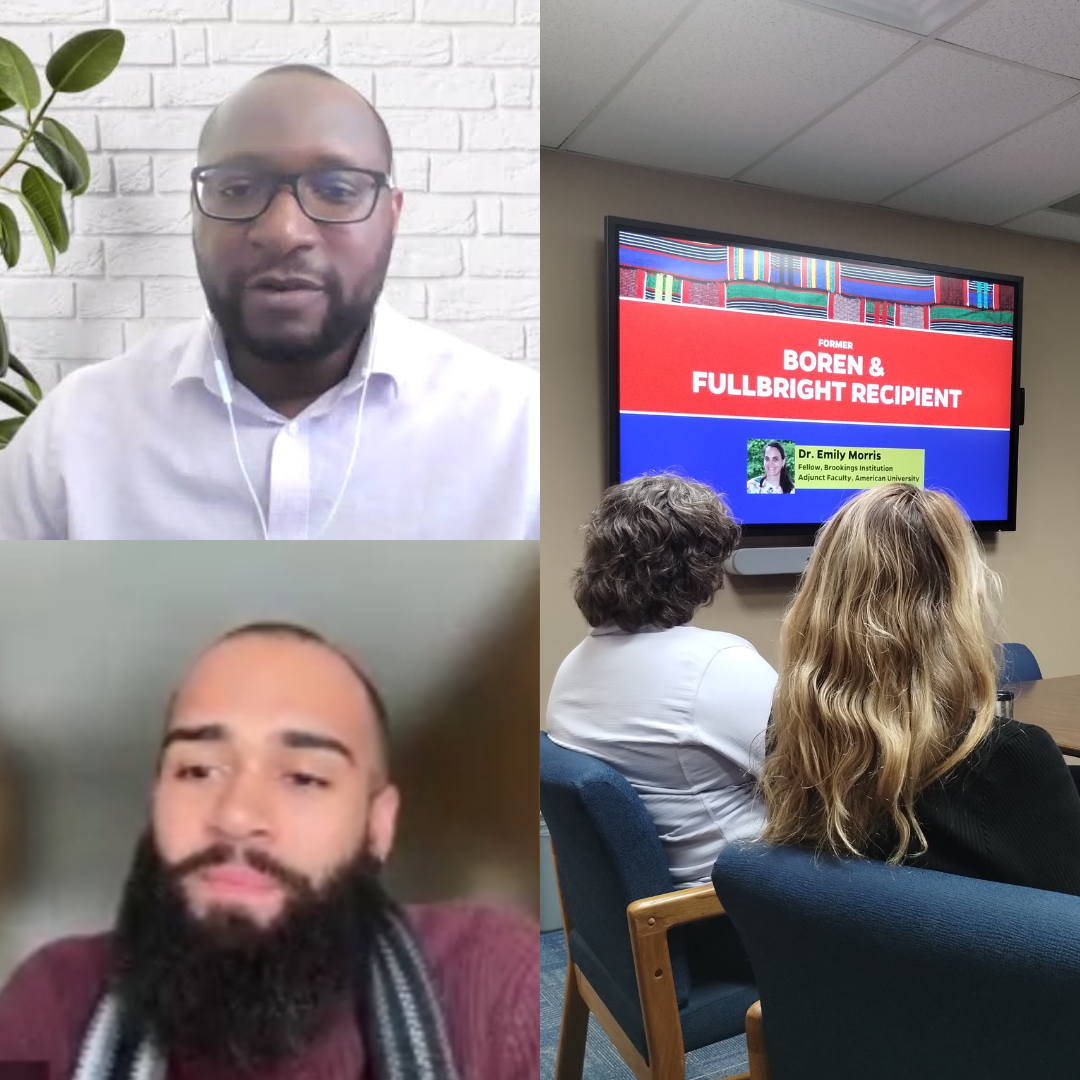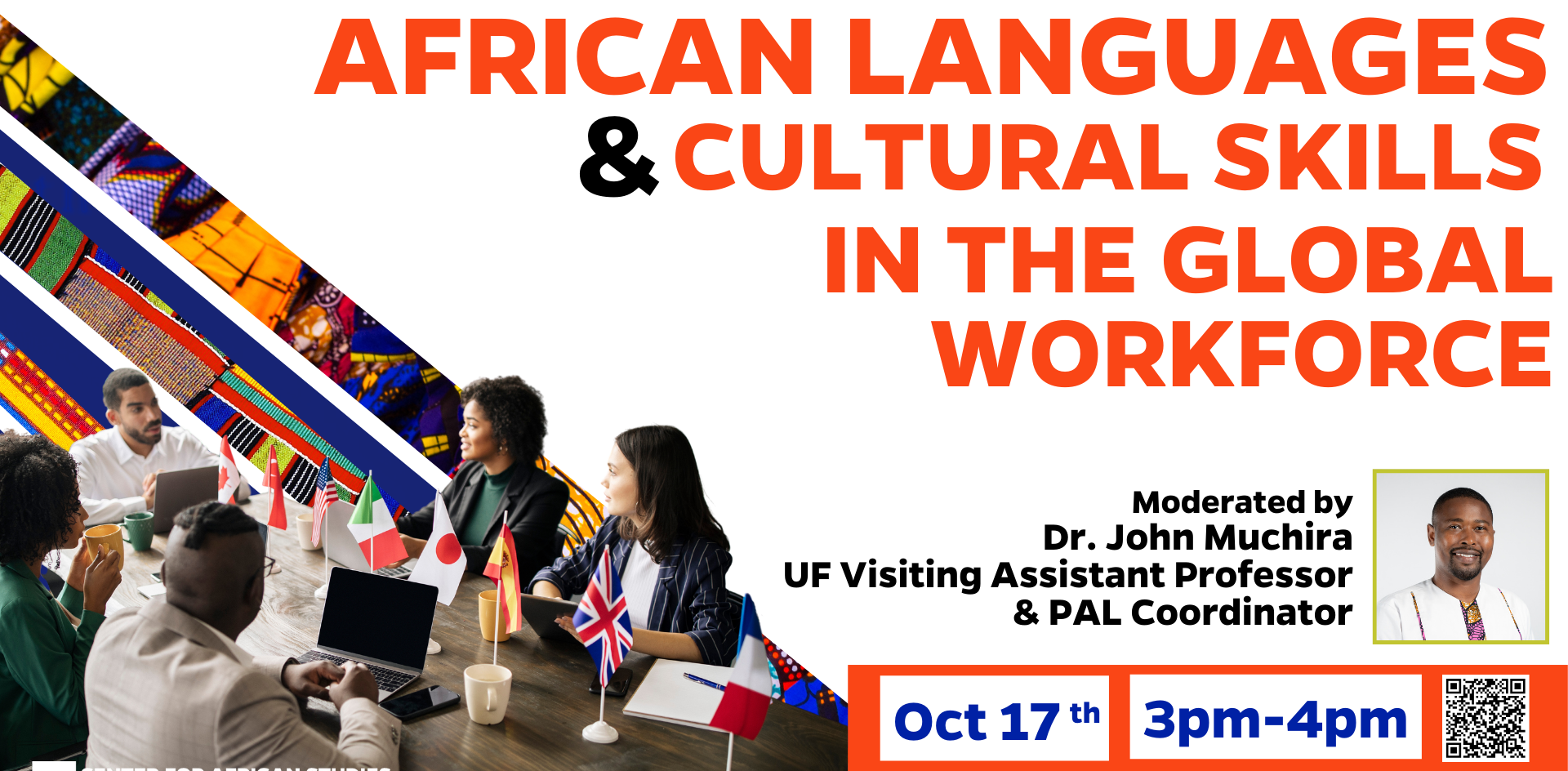On October 17th, the Program in African Languages (PAL) kicked off the first of the three-part webinar series titled “African Languages and Cultural Skills in the Global Workforce.” This webinar aimed to empower students by highlighting the critical value of learning African languages in today’s workforce, discussing funding opportunities, and sharing the testimonies of students who have studied African languages. The webinar was moderated by PAL coordinator Dr. Muchira and co-hosted by professors and practitioners with extensive experience working on federal government-funded projects, study-abroad programs, and leadership in African language education. Among the speakers were Professor Jonathan Choti of Michigan State University—president of the African Languages Teachers Association (ALTA)—and Dr. Peter Mwangi of the University of New Mexico, and Dr. Kazeem Kanuth , associate director of the National African Language Resource Center (NALRC) at Indiana University, Bloomington.

Former language students have been able to use these skills throughout their careers, and this event was a great reminder of the value of African languages. We were pleased to have Dr. Emily (Markovich) Morris , Kevin Lockett , and Sarah Gates , past African language students who have used their language skills to manage research and development projects and work with communities in sub-Saharan Africa and the United States for various organizations.
In her presentation, Dr. Emily (Markovich) Morris, an educator, researcher, and evaluator in the field of international education and development, discussed how she acquired advanced Swahili language and cultural proficiency. Dr. Morris, who is currently a Fellow at The Brookings Institution and an Adjunct Professorial Lecturer at American University, also explained how she has continued to use these skills in her professional work. She traces her journey to the informal Kiswahili lessons back in 1996 with her advisor, Mwalimu (Teacher) Musifiky Mwanasali, when she started teaching her the basics of the Swahili language over his lunch hour, and Bi Mariam Said Ali, who taught her the first immersion course in Zanzibar. Learning Ndebele, a Bantu language majorly spoken in South Africa and Zimbabwe, was very helpful. She believes that learning any African language is a major asset when learning other African languages in the future. Some cultural elements are interrelated, and some languages belong to the same family, especially the Bantu languages. Dr. Morris presented the following graphic to demonstrate how she has utilized the African language and cultural skills she has acquired in the world of work.
Previously, Dr. Morris was a Chief of Party and Country Director who was tasked with overseeing the implementation of a four-million-dollar USAID project in nine districts in Mainland and Zanzibar, Tanzania (Radio Instruction to Strengthen Education) and an additional one-million-dollar project in Zanzibar (Zanzibar Teacher Upgrading by Radio)
Kevin Lockett, a former Boren fellow and 2023 UF graduate, also presented how he utilizes his language and cultural skills in his job here in the US. Kevin encouraged prospective students to learn an African language such as Kiswahili, which is designated as a “critical language” and is of national interest as there are few speakers nationally. The over $30,000 scholarship awards from the National Security Education Program (NSEP), alongside FLAS and Boren, supported him in studying Swahili overseas in Arusha, Tanzania. Kevin works as a Reception & Placement Caseworker in Tallahassee’s International Rescue Committee office, providing trauma-informed services to refugees and other qualified immigrants. Kevin’s responsibilities involve conducting intake services with clients to assess needs, developing self-sufficiency plans and timelines in partnership with each client, and providing individualized support through direct services, referrals, and advocacy.
Sarah Gates, also a Boren fellow in 2014 at the UF Center for African Studies African Flagship Languages Initiative (AFLI), presented how acquiring language skills and cultural competencies has contributed to her transition from education to the world of work. Her insights on the role of language and cultural competencies in the workplace were drawn from her vast experience working with various organizations, including FHI 360 as a Technical Officer for Global Education, Employment, and Engagement (G3E) and as a Research intern in the Education Policy Data Center, Technical Advisor with Catholic Relief Services, and EnCompass where she is currently serving as a Monitoring, Evaluation, and Learning Specialist. Sarah highlighted the importance of the skills learned from African languages in developing rapport, particularly with colleagues, research participants, and other stakeholders. She also opined that speaking an African language, even if it’s different from the spoken language among colleagues or community members you are engaging with, can demonstrate effort in developing credibility and a sense of belonging in the larger community. Finally, she stressed that African languages, like other less commonly taught languages, are essential for training students’ brains to be sensitive to other epistemologies and ways of knowledge.
The first webinar was a true success. PAL plans to continue the series with the second webinar in the second week of February 2025 and the third webinar in mid-April. Northwestern University’s African Studies Program will co-host with two other institutions as we scale up conversations on the impact language and cultural skills have on graduate students’ employability. Dr. Muchira hopes to use the webinar to promote African languages, inform participants about the AFLI program, and build networks with relevant scholars and project implementers in sub–Saharan Africa for potential collaborations.
Click here to learn more about UF’s Program in African Languages
Watch the full Webinar:

